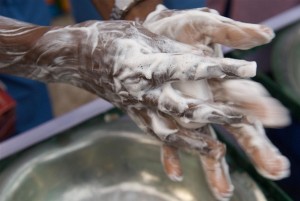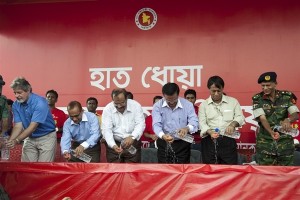“Clean hands save lives” – Global Handwashing Day 2011 is celebrated by millions of people worldwide
2011-10-14

NEW YORK/ HONG KONG, 14 October 2011 – UNICEF joins hundreds of millions of people across the globe tomorrow in celeating the 4th annual Global Handwashing Day, emphasising the importance of handwashing with soap as an effective, simple, and affordable way to prevent disease.
A number of exciting events are taking place for the 2011 celeation of Global Handwashing Day on 15 October. Teachers, parents, celeities and government officials are motivating millions to lather up to prevent life-threatening diseases such as diarrhoea and acute respiratory infections.

In Afghanistan, 1.7 million children from 1,700 schools will wash hands; in Eritrea, 326,809 children in 1,272 schools will do the same. In Peru, the government has declared a national handwashing week as of 10 October, and events will involve 3.5 million students in 20,000 schools. Eight million children in Rajasthan, India, and over 1 million children in Pakistan will also participate in handwashing events. These and other activities promise to surpass celeations in 2010, which saw 200 million people and 700,000 schools in over 70 countries honouring the day.
These events are aimed at spreading a life-saving message: clean hands save lives. UNICEF estimates that diarrhoea kills 1.1 million children every year, and pneumonia-related illnesses take another 1.2 million child lives. Handwashing with soap prevents disease in a more straightforward and cost-effective way than any single vaccine.
The simple act of washing hands with soap at critical moments – such as after using the toilet or before handling food – is an easy and affordable intervention that can reduce the incidence of diarrhoea among children under five by almost 50 per cent, and cut respiratory infections by as much as 25 per cent.

“Soap is not in short supply, even in developing countries,” said Therese Dooley, UNICEF’s Senior Adviser for Hygiene and Sanitation. “The vast majority of poor households have soap in the home. The problem is that soap is used for laundry or bathing, but rarely for handwashing.” Dooley added that UNICEF would like to ensure handwashing with soap becomes a social norm in all countries.
Governments around the world have now adopted Global Handwashing Day as a national celeation, wanting the event to be more than just a day, and to ensure that handwashing with soap is promoted throughout the year. In 2010, for example, all schools –18 million children –across Bangladesh, participated in mass handwashing demonstrations on October 15. The events were used as a platform to launch the Bangladesh government’s National Hygiene Campaign which aims to change the way the country uses soap, and in particular to promote its use in handwashing.
 |
 |
Global Handwashing Day is celeated on October 15. The Global Public-Private Partnership for Handwashing with Soap initiated Global Handwashing Day in 2008, and it is endorsed by governments, international institutions, civil society organisations, NGOs, private companies and individuals around the globe. Please visit www.globalhandwashingday.org









